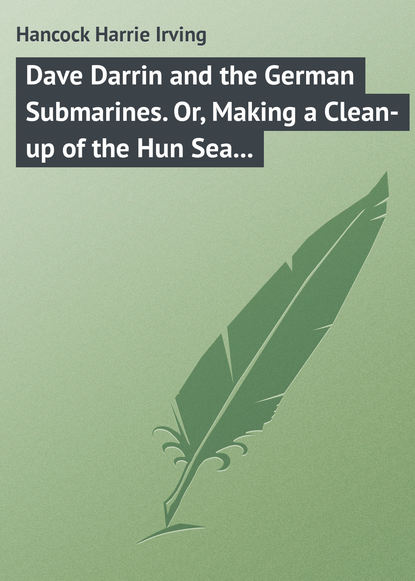По всем вопросам обращайтесь на: info@litportal.ru
(©) 2003-2024.
✖
Dave Darrin and the German Submarines. Or, Making a Clean-up of the Hun Sea Monsters
Настройки чтения
Размер шрифта
Высота строк
Поля
“Not breeds, but brings out,” answered Darrin.
They were nearing the coast now. Destroyers, patrol boats, drifters and mine-sweeping craft sighted the “Logan” and her prize, and the shrill whistles of these hunters of the sea testified to their joy over the capture.
Then the destroyer and her prize entered the port. Darrin brought his craft to anchorage, while the captured submarine was anchored not far away. The German prisoners were taken ashore under guard and turned over to the British authorities.
Ober-Lieutenant von Bechtold, under the charge of being a spy, was marched away under a special guard.
And then Dave made haste to present himself, with the half-destroyed sheet of paper in his pocket, before the flag lieutenant of Vice Admiral Speare.
CHAPTER V – DAVE TALKS OUT IN COUNCIL
There was much joy aboard a squadron of six more destroyers, just arrived from Uncle Sam’s country, when, on steaming into port, they heard the news of the capture.
So far as Dave was concerned the document that he had discovered, mutilated as it was, had supplied hints that filled the British Admiralty and the American naval commander with deep apprehension.
Both Darrin and Dalzell were present in the crowded council room on board the vice admiral’s flagship. There were other American naval officers, as well as a few American Army staff officers present. Their faces displayed anxiety.
“It is too bad,” one of the American army staff officers declared, after scanning the damaged sheet under a magnifying glass, “that so much of this is obliterated. Of course, Mr. Darrin, we know that you acted promptly and that you did all in your power, and at considerable risk, to preserve this document. From the disconnected sentences that we can decipher, it would seem that at least sixty of the enemy’s submarines are to concentrate in near-by waters. It is also plain that their mission is to destroy the convoy escort and sink the troopships that are nearing these waters – troopships that convey the entire One Hundred and Seventeenth Division of the United States Army.”
“It would be a frightful disaster, if it came to pass,” boomed the deep tones of a British naval officer.
“It shall not come to pass!” declared an American naval officer.
“Easily said, and I hope as easily done,” replied the British officer. “But you Americans have not yet begun to lose ships loaded with troops. We Britishers have had some sad experiences in that line. Never as yet, though, have we had to face a concentration of sixty enemy submarines!”
“The way it looks to me,” said another American army staff officer, gravely, “is that, while the destroyer escort will surely sink some of the enemy submarines, yet just as surely, with the enemy in such force, will some of our troopships go to the bottom. It is mainly, as I view it, a question of how many troopships we are likely to lose, and how big a loss of soldier life we shall suffer.”
“Sixty submarines!” uttered a British naval officer, savagely. “We haven’t an officer on a destroyer who wouldn’t gladly go to the bottom if he could first have the pleasure of sinking a few of these deep-sea pests!”
“A distressing feature is that we cannot decipher the very part of this document which states where the submarine concentration is expected to strike,” declared a naval staff officer.
“How many British destroyers will be needed to reinforce the available American destroyers?” asked a British officer, apprehensively. “For we have so many uses for our destroyers, on other work, that it is difficult to guess where we are to find destroyers enough to help you Americans.”
This was known, by all present, to be only too true. The British Navy, from super-dreadnoughts to the smallest steam trawlers, was painfully overloaded with work.
“As Mr. Darrin is a destroyer commander with an uncommonly good record to his credit,” said an American naval staff officer, “and as we have not yet heard his opinion, I think we would all like to have his views.”
Dave Darrin glanced at the American naval commander, who sent him an encouraging nod.
“We know, then, gentlemen,” began Dave, “just how many American destroyers are to act as escort to the troopship fleet that is bringing the One Hundred and Seventeenth Division across. We know, also, just how many destroyers under our flag can be taken from patrol duty to safeguard the troopship fleet. We know the length of the sailing line of the troopship fleet; we know the speed of our destroyers. It seems to me that the answer is to be found in these known facts.”











